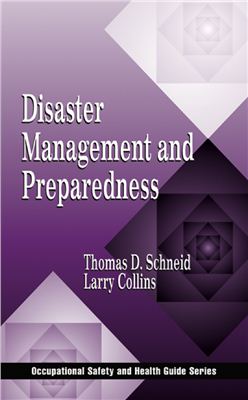ISBN 1-56670-524-X, Publisher: CRC Press; 1 edition (22 Nov 2000),
264 pages
By watching the daily news or reading a newspaper, we quickly understand that disasters happen regularly. They take many forms, ranging from natural disasters such as toadoes, to man-made disasters such as workplace violence. No matter what type, the results are usually the same: substantial loss of life, money, assets, and productivity. This book details a new and innovative method for preparing companies and organizations to address the substantial risk of disasters in the workplace. It encompasses not only the tried and true tactics used by safety experts for decades but also focuses on areas often overlooked during the reactive and post disaster phases. Technological progress and terrorist activities has forced safety professionals to rethink their modus operandi for disaster preparedness and expand their proactive measures to safeguard assets on all levels and at all times. From natural disasters to acts of terrorism, you never know when something catastrophic will happen to your organization. But once it does, it is too late to go hunting for a plan of action. Be prepared. Be proactive. Make your disaster management plan before disaster strikes. This book gives you the how-to for avoiding the common mistakes which tu natural and man-made catastrophes into economic disasters.
Contents:
Identifying the Risks
Natural Risks
Emerging Risks
Govemental Regulations
Structural Preparedness
Coordinating with Local Assets
Preplanning for a Disaster
Eliminating, Minimizing, and Shifting Risks
Developing an Action Plan
Developing the Written Plan
Effective Communications
Selecting the Right People
Training for Success
Media Control
Shareholder Factor
After A Disaster - Minimizing the Damage
Govemental Reactions
Legal Issues
Disability Issues
Disaster Preparedness Assessments
Personal Disasters – Use of Criminal Sanctions
Appendix A – OSHA Inspection Checklist
Appendix B – Employee Workplace Rights
Appendix C – Web Sites for Disaster Preparedness Information and Equipment
Appendix D – Typical Responsibilities
Appendix E – Potential Sources of Disaster Preparedness and Management Assistance Through Local Colleges and Universities
"This is a very helpful book in leaing about disasters and the different elements necessary for creating a company disaster plan. Overall, the book is great. If you are looking for a text to summarize and explain the elements of a disaster plan or are a student debating whether the book is really worth buying for a class, this text is highly recommended . "
By watching the daily news or reading a newspaper, we quickly understand that disasters happen regularly. They take many forms, ranging from natural disasters such as toadoes, to man-made disasters such as workplace violence. No matter what type, the results are usually the same: substantial loss of life, money, assets, and productivity. This book details a new and innovative method for preparing companies and organizations to address the substantial risk of disasters in the workplace. It encompasses not only the tried and true tactics used by safety experts for decades but also focuses on areas often overlooked during the reactive and post disaster phases. Technological progress and terrorist activities has forced safety professionals to rethink their modus operandi for disaster preparedness and expand their proactive measures to safeguard assets on all levels and at all times. From natural disasters to acts of terrorism, you never know when something catastrophic will happen to your organization. But once it does, it is too late to go hunting for a plan of action. Be prepared. Be proactive. Make your disaster management plan before disaster strikes. This book gives you the how-to for avoiding the common mistakes which tu natural and man-made catastrophes into economic disasters.
Contents:
Identifying the Risks
Natural Risks
Emerging Risks
Govemental Regulations
Structural Preparedness
Coordinating with Local Assets
Preplanning for a Disaster
Eliminating, Minimizing, and Shifting Risks
Developing an Action Plan
Developing the Written Plan
Effective Communications
Selecting the Right People
Training for Success
Media Control
Shareholder Factor
After A Disaster - Minimizing the Damage
Govemental Reactions
Legal Issues
Disability Issues
Disaster Preparedness Assessments
Personal Disasters – Use of Criminal Sanctions
Appendix A – OSHA Inspection Checklist
Appendix B – Employee Workplace Rights
Appendix C – Web Sites for Disaster Preparedness Information and Equipment
Appendix D – Typical Responsibilities
Appendix E – Potential Sources of Disaster Preparedness and Management Assistance Through Local Colleges and Universities
"This is a very helpful book in leaing about disasters and the different elements necessary for creating a company disaster plan. Overall, the book is great. If you are looking for a text to summarize and explain the elements of a disaster plan or are a student debating whether the book is really worth buying for a class, this text is highly recommended . "

